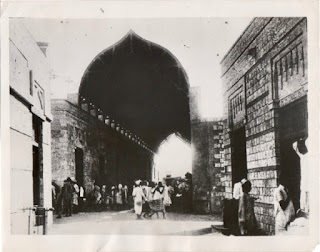It has been 10 days since I arrived in Djibouti. It is 30+ degrees celsius here and I do not leave the indoors much in the daytime, which gives me time to ruminate and read. The currency here is the Djiboutian Franc and there are usually power-outs every week.
Much has happened though I will focus on one individual. I have met a Somali-Canadian gentleman here whose name is Sahal Ali. He invests in agricultural products in the countryside. While staying at the same hostel, we are lucky enough to hear the azaan every day from the neighboring mosque. The man who conducts the azaan is very good. Coincidentally, I am also reading a book about Africa and the Indian Ocean World, which traces the spread of trade in these two regions as well as the proselytization of Islam. My new friend Sahal Ali also helps with my understanding of the religious-cultural terrain. Upon learning about my research interests, he has shared photos of his travels to a museum in Massawa, Eritrea. The city of Massawa, like Djibouti, is a a historically important port that hosted traders of varied ethnicities, many of whom were Muslim. The Ottomans also had official ties with the Emirs, one of whose name is Emir Abdullah (not to be confused with the Hashemite Abdullah of the Arab revolt). Sahal Ali knows one of the traders of cultural artifacts in this town and has said that the trader owns a copy of a 9th-century Quran. I wonder if it is for sale or just for show and tell.
Sahal also has a very interesting background. He traveled to Canada to pursue his studies in 1991 when he was 16 years old. He learned French and settled in Ottawa for work--he translated and processed immigration applications. Perhaps that explains his friendly attitude and organized demeanor. I said I have always wanted to visit Toronto because of its diverse inhabitants. He has some relatives in California as well.
He became bored of the job after 18 years and also faced many Islamophobic harassment due to his name, which was "Ali." He also found that the Canadian government tried to pass citizenship laws that infringed upon the rights of his second-generation children: a certain law (I am not sure if it passed or not) stipulated that if second generation Canadians commit a crime in Canada, they faced deportation.
He decided to move back to where he was born. Many of his colleagues and friends found his decision to be ridiculous, but so far things have gone well until the shutdowns related to the coronavirus pandemic occurred. Sometimes he visits Canada as well and drives for a smart-phone app car service. When white men board his car, he asks them where they are from. First they are usually puzzled, but after his insistence and explanation ("I am always asked where I am from"), they tell him that their grandfathers or fathers came from another country. He felt satisfied in knowing that white Canadians also come from elsewhere, though the laws and social culture may inadvertently benefit them more.
His father used to live in the Somali area of Ethiopia as well, which gave him a unique perspective about the country. He criticized the old regime for colonizing Somali land and pushing for Ethiopian supremacy, but finds that now the politics is more balanced, since a Somali can become a president of Ethiopia (which I assume was not the case before). He is amazed that Ethiopia did not manage to occupy a place with a port after many years of dominance in the region. I said I did not know much about these events before, and I only read about the Ottoman participation at the Berlin conference (1884–1885), which was an international conference regulating the Scramble for Africa and her resources. Sahal said that Ethiopia delegates also participated at this conference, though I have yet to find a written source to confirm this statement.





